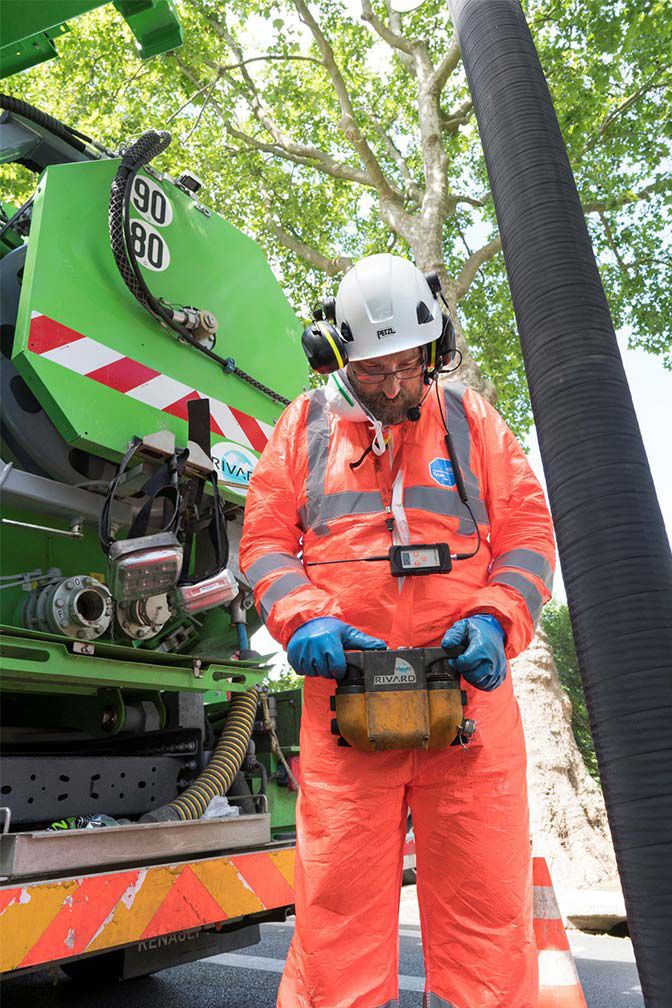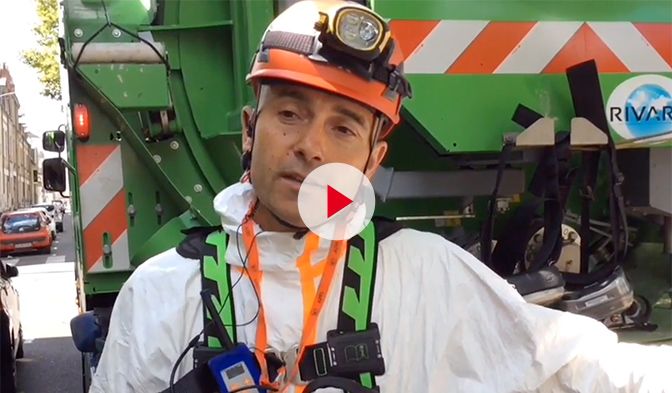DuPont garments protect sanitation workers from multiple safety risks
_197_Image-01_672px)
If you work in water treatment and sanitation, dealing with physical blockages is literally the tip of the iceberg. Those who work to keep our sewers functioning and our water supply clean face serious risks on a daily basis: ranging from encounters with rats and snakes to exposure to harsh chemicals and confined spaces.
As part of a comprehensive approach to safety, one French local authority is now issuing its sanitation workforce with DuPont protective garments to protect them from multiple biological and chemical risks without compromising on their comfort and freedom of movement.
Culture of safety
_197_Image-02_672px)
In March 2017, Tours Métropole Loire Valley assumed regional responsibility for the control of water management, its distribution and its treatment. Assigned to the Sanitation Department, this duty consists in particular in servicing and expanding the wastewater collection network, and supplying quality drinking water to the citizens of the 22 districts making up the metropolitan area.
The region’s water network is designed to collect domestic wastewater and rainwater and transport dirty water for processing prior to being discharged back into the natural environment. The sanitation network consists of 750 miles of gravity flow sewers carrying wastewater to the territory's pumping stations and 16 wastewater treatment plants, as well as transporting rainwater collected via the drains for discharge directly into the river.
_197_Image-03_672px)
To limit run-off phenomena and the risks of flooding, the monitoring, maintenance and cleaning of the sanitation network is essential. This is the role of the 30 agents of the Tours Métropole Loire Valley sanitation networks team. Responsible for the maintenance, surveillance, dredging and cleaning of the wastewater and rainwater evacuation network, the sanitation agents are faced with a multitude of hazards. Physical working conditions alone can include limited access, confined spaces and working at heights, as well as being permanently wet.
"The department must conduct a precise assessment of the risks, taking into account all the characteristics of the networks, the drains and the pumping stations," explains Franck Deruelle, HSE accident prevention officer and CATEC* instructor with Tours Métropole Loire Valley for the past 10 years. "Cleaning sewers is extremely demanding, both physically and psychologically. It is vital for the health and safety of our agents that we safeguard their comfort; not only through the relevant choice of Personal Protective Equipment (PPE) and ensuring that it is worn, but also through training".

With its training center certified in the prevention of risks in the workplace, Tours Métropole Loire Valley is able to provide all training related to working in confined spaces in-house, making it a pioneering metropolitan authority in France. A sound safety culture on the part of the district authorities also includes the use of Tyvek® 800 coveralls from DuPont Personal Protection to protect its sewer workers during cleaning operations.
Whenever their intervention is required, the agents must follow safety procedures to the letter. Compliance, overseen conscientiously by Franck Deruelle, is aimed at avoiding serious accidents such as drowning, falls from heights and oxygen starvation.
Extreme conditions
Some tasks are more hazardous than others. During storm drain dredging operations – which entails in removing sludge from the network using a vacuum dredging pipe to prevent the drain from clogging up – sewage workers have to work on their knees or even lie flat, in a very wet environment. When rainwater enters the drains, it brings waste: earth, leaves and also unregulated or accidental hazardous products into the street. The sewer cleaners can then find themselves exposed to chemical as well as biological risks. In wastewater pumping stations, the sanitation workers are subject to these same risks when they carry out high-pressure cleaning of the screen rakes, walls and floors, using a bactericide product for dislodging the paraffin wax and preventing station saturation.
A specialist in high-risk jobs, Franck Deruelle knows all about PPE and DuPont Personal Protection which, according to him, "has a reputation for seriousness and quality that speaks for itself". To guarantee the workplace safety of Tours Métropole Loire Valley sanitation agents, Franck Deruelle has chosen DuPont™ Tyvek® 800 coveralls, which are used for cleaning operations in water treatment plants, sewage networks, pumping stations, certain holding tanks and water towers.
Worker comfort assured
Offering excellent mechanical resistance and an efficient barrier against chemical and biological risks, Tyvek® 800 coveralls possess all the criteria necessary for working in complete safely in confined and very wet spaces. As Franck Deruelle points out:
"The protective garment must not only be resistant to abrasion and tearing, but also to hyper-extension; since the sewer cleaners conduct their missions in extreme postures (kneeling, squatting, lying flat). From the very outset the garment is severely tested. The stitching must be flawlessly resistant, and in this respect the choice of Tyvek® 800 was ideal for our activity since, with its stitched and covered seams, it is extremely robust".
According to Deruelle, another advantage of Tyvek® 800 is its combination of breathability and perfect watertightness. "These protective coveralls guarantee a watertight seal and provide a waterproof and breathable garment for our agents, despite working in networks where there is always a residual water level ranging between five and more than 10 cm ".
More at ease in their new PPE, the sewer cleaners appreciate the coverall design, which offers great freedom of movement even in confined spaces, thanks to elastic cuffs and the flexibility and lightness of the fabric itself. Other design features include a chin flap for increased liquid protection and a closer fit when wearing full face masks, thumb loops to prevent the sleeves from riding up, and distinct orange taping of the garment seams which aids worker visibility. Additionally, Tyvek® 800 coveralls provide protection against biological hazards in accordance with EN 14126.
In conclusion, Frank Deruelle says: "Tyvek® 800 coveralls provide a reliable solution to the protection needs of our sanitation agents, but above all offer the quality and comfort when wearing the garment that is so vital when it comes to alleviating arduous working conditions."
Having been thoroughly impressed with the quality of these protective garments from DuPont Personal Protection, the sanitation services of Tours Métropole Loire Valley will soon be equipping their agents with Tyvek® 500 HV coveralls. Already successfully deployed by highway workers, this high visibility garment will be used by workers responsible for operating the vacuum dump truck and for certain night work.
_________________________________________________________________________________________
* CATEC – French acronym for ‘certificate of aptitude for working in confined environments’.
